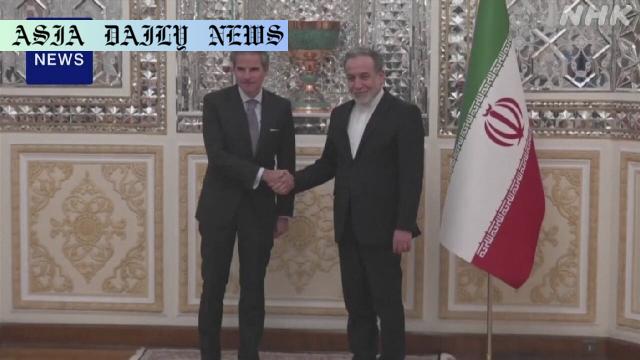Iran Nuclear Talks: Iran asserts readiness to build trust but insists uranium enrichment remains non-negotiable.
- The Iranian foreign minister met with the IAEA chief to discuss nuclear cooperation.
- Talks serve as a prelude to the second round of Iran-US negotiations.
- Iran reaffirmed its nuclear program’s peaceful intentions and non-negotiable status on uranium enrichment.
- The meeting hints at Iran’s willingness to cooperate while addressing international concerns.

Background on Iran’s Nuclear Program
Iran’s nuclear program has long been a focal point of international diplomacy, raising concerns among various nations regarding its intentions. The country’s leadership, including its foreign minister Abbas Araghchi, has consistently maintained that its nuclear activities are focused solely on peaceful development. However, as global tensions rise over the prospect of uranium enrichment, diplomatic efforts have become increasingly urgent.
Rafael Grossi’s Meeting with Iranian Leadership
The recent meeting between Araghchi and the International Atomic Energy Agency (IAEA) chief Rafael Grossi indicates Iran’s willingness to engage transparently. Grossi emphasized on social media that Iran’s full cooperation with the IAEA is imperative for providing assurances about the peaceful nature of its program. At the same time, Iran hopes to rebuild trust with international stakeholders and showcase its willingness to adhere to global norms, albeit firmly holding onto its right to uranium enrichment.
Strategic Importance of the Second Round of Talks
Scheduled to take place on Saturday, the second round of Iran-US talks represents a pivotal moment for defining the trajectory of their relationship. During this discussion, global diplomacy is expected to focus on the United States’ strategy under President Trump, which has historically been more confrontational. Iran, on the other hand, has signaled its readiness to engage while asserting core non-negotiable aspects of its program.
Challenges Facing Diplomacy
While many global powers advocate for dialogue and constructive compromise, substantial roadblocks remain. Chief among them is Iran’s commitment to uranium enrichment, which many Western powers perceive as a step toward nuclear proliferation. Striking a balance between Iran’s sovereign rights and international concerns will likely require balancing diplomacy and mutual concessions. The IAEA’s involvement signals a moderate approach that could assure impartiality and scientific accuracy in determining Iran’s compliance with global expectations.
Conclusion: A Path Toward Resolution?
The upcoming talks and recent engagements underscore the critical nature of building trust among international stakeholders while preserving Iran’s rights. However, the success of these negotiations will depend on the extent to which both sides are willing to make meaningful compromises. Transparency, expert oversight, and a sincere commitment to diplomacy could pave the way for sustainable solutions. At the same time, any failure in these talks could lead to further isolation and heightened risks for all parties involved.



Commentary
The Significance of Diplomacy in Global Politics
The meeting between Iran’s Foreign Minister and Rafael Grossi is a testament to the pivotal role diplomacy plays in mitigating global conflicts. In an era where geopolitical tensions are at an all-time high, it is heartening to observe nations engaging in dialogue as a means to resolve their differences. Iran, despite its firm stance on uranium enrichment, appears to be signaling its willingness to cooperate—a move that could catalyze trust-building among international stakeholders.
The Role of the International Atomic Energy Agency
The involvement of the IAEA highlights the importance of having a neutral, science-based organization oversee such discussions. Rafael Grossi’s emphasis on transparency speaks volumes about the role of factual data in debunking misinformation. By committing to cooperation with the IAEA, Iran could potentially showcase the peaceful intentions of its nuclear activities, thereby discrediting detractors and gaining support from neutral parties.
The Way Forward
While the situation holds promise, challenges loom large. The polarized nature of the Iran-US relationship means that finding common ground will not be easy. Both parties must understand that the cost of a breakdown in negotiations is far greater than the cost of compromise. Moving forward, it will be crucial for global powers to advocate for patience, understanding, and adherence to international norms. Only then can diplomatic efforts pave the way for long-term peace and security.